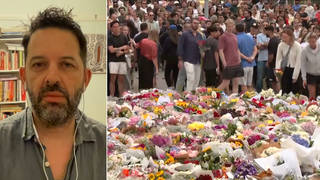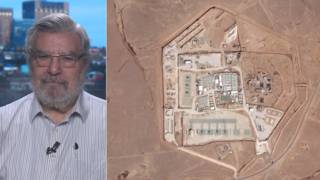
British Prime Minister Tony Blair has announced plans for the withdrawal of an initial 1,600 British troops from Iraq. We go to London to get reaction from distinguished British politician Tony Benn. [includes rush transcript]
Transcript
AMY GOODMAN: British Prime Minister Tony Blair has announced a timetable for the withdrawal of British troops from Iraq. Blair made the statement today to members of Parliament in the House of Commons. Seven thousand British troops are currently deployed to Iraq. Blair’s comments, just one month after declaring a troop withdrawal later this year would be a disastrous policy.
PRIME MINISTER TONY BLAIR: For us to set an arbitrary timetable — and that is what it is, it’s arbitrary, it’s not attached to the conditions in Iraq, it’s simply saying that we will pull British troops out in October, come what may — that would send the most disastrous signal to the people that we are fighting in Iraq.
AMY GOODMAN: That was Tony Blair just a few weeks ago. Well, Tony Benn joins us now, one of Britain’s most distinguished politicians, longest-serving MP in the history of the Labour Party, joining us on the phone from London. Welcome to Democracy Now!, Tony Benn.
TONY BENN: Oh, yes. I’ve just been watching the prime minister’s statement on the television. So it’s exactly a good moment to ring.
AMY GOODMAN: Can you give us an update on exactly what the prime minister said?
TONY BENN: Well, the headlines and the briefings have been about a withdrawal of 1,600 troops. But when I listened to the prime minister, it was a complete reaffirmation of the support for the war, of the support for President Bush, support for the surge, which the American president has announced, which has divided the House of Representatives. And so, there wasn’t really any change. But Blair is due to retire in a matter of weeks. And I’m afraid, I suspect, that this is a gimmick at this stage, so that he can claim that the mission is being accomplished and therefore the troops can be withdrawn.
And on the question of Iran, he repeated ominous warnings. So I don’t think too much will be read into this. Obviously, I’m glad if any troops are brought home, because they’re in an impossible position. But there is something about it that didn’t really ring true.
AMY GOODMAN: I mean, it’s very interesting. The clip we just played was not the prime minister speaking today addressing the House of Commons, it was just a few weeks ago, where he said any kind of timetable would be disastrous.
TONY BENN: Yes.
AMY GOODMAN: Today, he’s announcing precisely the opposite and that troops are coming out in these next few weeks.
TONY BENN: Well, I think that is the right interpretation. I think it is something that he can use to sort of justify his policy just before he retires. But I didn’t detect anything that he said — and watched it very, very carefully — that varied from the position that he’d occupied up to now. Also, we sent some more troops to Afghanistan. So some of those troops who might have come home may well be sent to Afghanistan, which is another hopeless cause.
And the other things he said about Israel and Palestinian were the usual nonsense about the roadmap. The real truth is there will not be peace between Palestine and Israel until the Israelis withdraw to their international frontiers. That means withdrawing also from the Golan Heights, which belong to Syria; from the Shebaa Farms, part of Lebanon; from the West Bank. And the argument that the Palestinians have to abandon violence, when Israel a few months ago launched into an attack that cost the lives of a thousand Lebanese, is not credible. The prime minister is not taking an independent position on the Israeli-Palestinian question. And so that has to be set into the balance, as well.
AMY GOODMAN: The prime minister saying to the MPs today, “The 7,100 British troops serving in Iraq would be cut by 1,600 shortly, with hopes of another 500 leaving at the end of the summer.” He said a British military presence would remain in Iraq until 2008, helping to secure the border with Iran, supply routes and support, if necessary. He said Basra remains a dangerous place, but said Iraqis could write the next chapter in its history, that the troops are ready to leave, the British troops, because the Iraqi troops could control the situation in Basra.
TONY BENN: Well, that was the outline of the statement. But I think, listening to it, it was basically a reaffirmation of everything that he has done up 'til now and, indeed, a reaffirmation of the long-term commitment to stay alongside President Bush's policy, which is more aggressive in tone, because, of course, the surge is a reinforcement at a time that it’s quite obvious that the coalition forces, the multinational forces, have lost control of Baghdad. And the consequences of this may not be as the prime minister intends. It may be that the increase of American military activity in Baghdad will renew violence in Basra, where we claim that we had a success, that I’m not sure we really have.
AMY GOODMAN: I mean, it seems the Bush administration is taking this seriously. Here you have Tony Blair just moments ago making this announcement in the House of Commons. Then you have Cheney speaking on an aircraft carrier near Tokyo, saying the American people will not support a policy of retreat.
TONY BENN: Well, I think that is the position it is in. It is an illegal and immoral, but an unwinnable war. And I think that that must — the fact that it’s unwinnable — must have played a considerable part in producing the midterm election results in the United States. And it is amazing to me, having served 51 years in the House of Commons, whereas the American House of Representatives could actually have a debate and a vote on the policies of the president, the House of Commons, on loyalty to Mr. Blair, has not had either an inquiry or a proper debate or a vote in which the prime minister has taken part. This is the first time he’s spoken about Iraq at any length in the House of Commons for months. He’s avoided the debate that took place two weeks ago. And now he comes along and says, “I was right all along, but we’ve been so successful that we’re going to withdraw some troops.” And I don’t really think it’s credible, though I welcome any withdrawal of troops, because of the suffering of our troops, just as you’ve lost — what is it? — 3,000 soldiers. We’ve lost far fewer, but a substantial number. And I think American and British opinion is pretty well united in wanting to see the troops coming home.
AMY GOODMAN: Tony Benn, is Tony Blair going to be stepping down soon?
TONY BENN: Well, this is what he said, that he would go by the summer. And if there’s to be a proper election to find his successor, only, of course, within the Labour Party, there would be a general election. He’s got to go indicate soon. And people are hoping, and I’m hoping, that he will announce it in May and actually leave in June.
But, you see, the thing overshadowing all this, as you know better than anyone, is this mounting threat to Iran. The enormous American fleet in the Gulf, the question of nuclear enrichment, which has — even the International Atomic Agency — has no connection with nuclear weapons, and the suggestion that Iran is interfering in Iraq. Well, if Iran is sending a few weapons into Iraq, what about the United States and Britain sending thousands of troops to Iraq? So it isn’t a credible argument. But it is the argument that Blair and the House of Commons did appear to be reaffirming in general, but claiming he’d been so successful he could withdraw some troops. It wasn’t credible to me. And I’ve always thought that he would want to say before he left office that it had been a successful mission and therefore some troops could come home. But I will believe it when I see it.
AMY GOODMAN: Tony Benn, there are protests planned for February 24 in Britain?
TONY BENN: Oh, an enormous march starting from Hyde Park and going to Trafalgar Square, where I’m speaking as president of the Stop the War Coalition. Really three issues brought together: first, the war, obviously; second, the decision by the prime minister that he wants to spend billions and billions of pounds sterling to adopt a new nuclear weapons system; and thirdly, the threat to Iran. It will be a big demonstration in London on the 24th.
And we watched with interest the big demonstration in Washington. And I think that the world peace movement across the whole globe is stronger than it’s ever been — in Australia, how it is being criticized. Wherever you look, you’ll find the movement, international movement for peace is growing in strength, just as the Vietnam War movement did in America. But even that was fairly well limited to the United States. This is now global. And so, I remain an optimist.
AMY GOODMAN: Do you think protests matter? Do you think they have an effect?
TONY BENN: Well, after the big demonstration in London four years ago, at which I spoke — there were two million people on the streets of London, the biggest demonstration in the history of Britain — and then people said, “Oh, what did it do? Nothing happened. We went on with the war.” And then came the midterm elections. And I think the peace movement must have played, in American opinion, a very large role in persuading the American voters to reject the Bush strategy. I was in the States a couple of years ago. And I’ve been over for the demonstration in New York about three years ago.
And, of course, the American peace movement is immensely powerful, and more significant because your midterm elections and your new Congress does allow that opinion to be expressed in a very effective way in terms of inquiries and whether to vote for funding, and so on. So, I mean, most people, including myself, look to the real America, which I love, to deal with this terrible problem created by the election of the neoconservatives, who believe that this is to be the American century. And I don’t think that they were right. And I think a heavy price has been paid for their mistake.
AMY GOODMAN: Finally, Tony Benn, you don’t see a fissure in the relationship between Tony Blair and George Bush now?
TONY BENN: Well, I imagine Bush is a little uneasy that Blair has found it necessary to say this, because it’s in contrast between the surge, on the one hand, of American troops and a very limited withdrawal of British troops. But I think, probably, Blair has said to Bush, “You’ll have to be patient. I’ve got to say this because I’m soon retiring, and I’ve got to suggest to the British people before I go that my policy has succeeded.” But I wouldn’t have thought the White House or the Pentagon were very happy about the statement, but they probably agreed to keep quiet about it in order to give a little bit of assistance to a man who has supported Bush totally uncritically from the beginning right up until today.
AMY GOODMAN: Tony Benn, I want to thank you very much for being with us, former British Labour minister.













Media Options